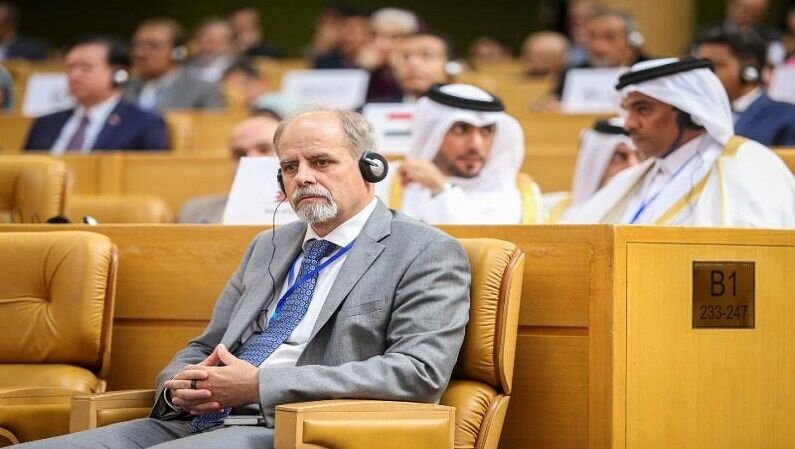Creating a fund necessary to tackle SDSs: UN envoy

TEHRAN- Stefan Priesner, the United Nations Resident Coordinator for Iran, has said creating a fund is a necessity to address the issue of sand and dust storms.
“At the opening ceremony [of the international conference on combating sand and dust storms] the respected president of Iran announced that the challenge of sand and dust storms is a universal challenge that demands international cooperation to be dealt with,” Priesner said in an address to the ending ceremony of the conference.
Held on September 9-10, the Conference was organized by the Department of Environment based on resolution number A77571 of the United Nations General Assembly in 2022, with the support of the United Nations. The event brought together representatives from more than 50 countries, highlighting the urgency of tackling SDS on a global scale.
Priesner added that during the two-day event, the impacts of sand and dust storms were discussed and some negotiations were also made by the countries affected by the predicament.
He went on to say that since sand and dust storms is a multidimensional issue, all the participating countries unanimously asked for international cooperation in this regard.
“Phenomena like sand and dust storms require us to make efforts to identify our points of strength and reinforce our cooperation.”
Half of the natural phenomena are caused by human interventions, which is why all participants have asked for taking decisive measures concerning water and soil, adopting policies to prevent soil degradation, and creating a fund to solve the problems, he highlighted.
Environmental degradation a global concern
Addressing the conference, President Ebrahim Raisi said environmental degradation is a global concern and is not related to a specific climate and country.
“God has placed a law in nature that while humans use water, soil, air, and space, they must respect the laws governing nature,” he pointed out.
All governments and international organizations should consider themselves obliged to these laws, Raisi stressed.
“The issue of water management is very important as the improper use of water resources is undoubtedly one of the main causes of sand and dust storms.”
He went on to say that certain countries only think about industrial development, which is an oppression of humanity and the environment.
He referred to consensus and convergence as the solution to finding a cure for this common pain
Environmental protection should not be influenced by political issues, because in this case, it will lead nowhere, the President highlighted.
Therefore, “yes” to development and “no” to environmental degradation has been emphasized in the Constitution of the Islamic Republic of Iran, Raisi said.
Global action to combat SDS
To tackle the rising issue of sand and dust storms, which affect over 150 countries across the world, coordinated global efforts are crucial, said AbdulHakim Elwaer, FAO Assistant Director-General, and Regional Representative for the Near East and North Africa at the International Conference on Combating Sand and Dust Storms in Tehran.
In his address on behalf of the United Nations Coalition on Combating Sand and Dust Storms, Elwaer emphasized the transboundary nature of SDSs, which affects over 150 countries and poses substantial threats to human health, food security, transportation, energy, and the environment. He pointed out that the economic losses resulting from a single SDS event can reach hundreds of millions of dollars, further underlining the urgency of the matter.
Elwaer highlighted the role of climate change in exacerbating SDS hazards, with changes in temperature and precipitation levels leading to drought and degrading vegetation cover. These impacts disproportionately affect farmers and communities reliant on natural resources for their livelihoods, making it essential to develop sustainable practices and policies.
To address this critical issue, the United Nations Coalition on Combating Sand and Dust Storms was established in 2019, comprising 19 UN agencies and non-UN organizations. Currently chaired by FAO, the Coalition is mandated to promote knowledge exchange, dialogue, capacity building, and global action against SDS.
Moreover, he emphasized the importance of implementing the Coalition's strategy and action plan to mobilize political will and resources and strengthen global cooperation. He stressed the need for international collaboration to mitigate the source and reduce the impact of SDS on people, societies, and economies.
MT/ MG
